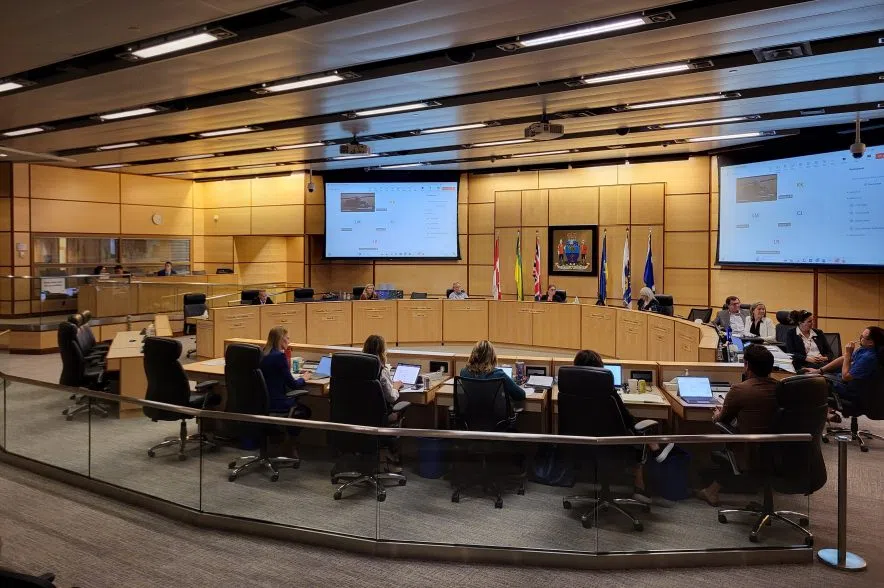After more than three years, Regina might have found its permanent emergency shelter.
During Wednesday’s executive committee, council approved a building operated by the Regina Eagles Club at 1600 Halifax St.
Council voted to move ahead with shelter in a 5-2 vote. Councillors Lori Bresciani and Terina Nelson voted against the motion. Councillors Dan LeBlanc, Shanon Zachidniak and Landon Mohl were away.
Council previously decided against buying two properties at 1420 and 1440 Albert St. in June after more than seven hours of discussion.
Many councillors and delegates raised concerns about the proposed location of the buildings.
On Wednesday, a chorus of delegates voiced opposition to operating the shelter on the Halifax Street location, citing concerns about safety and a lack of meaningful consultation from the city beforehand.
“We’re not that ‘NIMBY’, our backyard is full,” said Wendy Miller, director of the Heritage Community Association.
“We always welcome everyone in that community. But this time around, I think there needs to be way more engagement, way more funds, and a way bigger look at this picture.”
Miller added that the shelter would be a temporary measure for its users and the end goal should be finding homes for those who need them.
Mayor Sandra Masters successfully amended the recommendation to include a directive to consult with stakeholders and businesses within 250 metres of the site.
They are to be consulted before the Sept. 25 council meeting where a final decision will be made.
The recommendation brought to the committee also suggested expanding the services of Regina’s Street Team to the area around the proposed location.
But without extra funding, that would run the risk of stretching the team too thin according to Judith Veresuk with the Regina Downtown Business Improvement District (RDBID), which manages the Street Team.
“I understand that their jobs have an inherent risk. We all acknowledge that, but by spreading the team too thin across all of the city center, means lower levels of service and negative impact to employee well-being,” Veresuk told council.
Veresuk also asked for more consultation from nearby businesses, as most only learned of council’s intentions to buy the property on Friday.
However, Veresuk said RDBID has no opinion on the location of the shelter itself.
City manager Niki Anderson said the proposed Halifax shelter would be $6 million, a cheaper option compared to the $7.5 million needed for the Albert Street locations.
“As I said with the last opportunity, I can think of no neighbourhood that would universally welcome a new shelter in their area, and I can think of no location where everyone would agree that that is the right location,” Anderson said during the meeting.
Anderson said the Halifax location addressed several problems that were brought up regarding the Albert Street site, such as 1600 Halifax not being on a major thoroughfare and already being appropriately zoned.
“The location offers close access to core services, core city areas and public transit,” she said. “The property has a discrete entrance, an open layout and adequate size and the building does not require any major structural issues and offers adequate infrastructure and services.”
Anderson also said the city has a finalized agreement with the province to help fund the purchase if approved – another concern that was brought up regarding the Albert Street site.
Once finalized, the provincial and federal governments would each provide $3 million to the project.
The shelter will be operated by Regina Treaty/Status Indian Services. The city’s current temporary shelter at the Nest Health Centre expires next July.
More money for REAL
The Regina Exhibition Association Limited (REAL) is getting another cash injection.
In a 6-2 decision with Masters and Coun. Andrew Stevens voting against it, executive approved an additional $4 million 2024 operating grant so REAL can pay off its line of credit. The money will come from the city’s General Reserve Fund and will be paid before the end of October.
During the meeting, Roberta Engel, acting CEO and president of REAL, said REAL would maximize its line of credit by that date without the funding. She told council that the money was tied to the management of working capital and the funding of its forecasted loss for 2024.
“We are a one-of-a-kind property that welcomes millions of guests and users to our property annually. We are host major agricultural events that drive economic impact, create jobs in our province and support international sales,” Engel said.
“Our property and the work we do allows REAL the privilege to be an employer, to be a customer, a partner and a landlord and a service partner to the City of Regina.”
Engel said REAL’s operating income has continued to decline for various reasons since 2014 including the pandemic.











